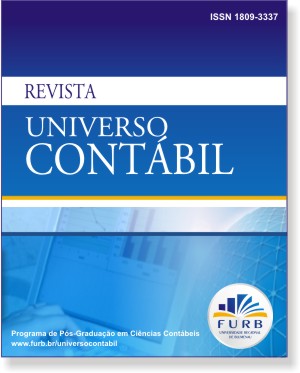ANÁLISE DOS FATORES QUE FAVORECEM A INSTITUCIONALIZAÇÃO DA VALUE BASED MANAGEMENT (VBM) À LUZ DOS ARGUMENTOS DE TEÓRICOS DA VERTENTE NEW INSTITUTIONAL SOCIOLOGY (NIS )
DOI:
https://doi.org/10.4270/ruc.20084Palavras-chave:
Teoria institucional, Value based management, Lucro residual.Resumo
As pesquisas têm demonstrado que existe um gap entre a teoria e as práticas de contabilidade gerencial. Entretanto, a abordagem Value Based Management (VBM), por meio de um de seus mais representativos componentes, o Lucro Residual, tem sido apontada nas pesquisas como uma das mais adotadas pelas empresas nos últimos anos, embora a sua conceituação seja bastante antiga. Para elaboração desse trabalho, recorreu-se à Teoria Institucional com foco na New Institutional Sociology (NIS), a qual tem sido utilizada por pesquisadores para explicar a estabilidade e os processos de mudança das práticas de contabilidade gerencial. A escolha da NIS tem como grande motivador o foco dado por essa abordagem ao isomorfismo. Este ensaio, teve como objetivo identificar as contribuições da Teoria Institucional para explicar a institucionalização da VBM com foco na NIS. Como resultados, reflexos de uma análise crítica que comparou os acontecimentos com as teorias da NIS, concluiu-se que a institucionalização da VBM sustentou-se fortemente no pilar cognitivo-cultural, com utilização do mecanismo mimético. Outro fator causal relevante foi a necessidade dos administradores legitimarem suas ações perante os acionistas, o que se materializa pela adoção da VBM. Reconheceu-se, também, o papel institucionalizador das empresas de consultoria e da mídia especializada.Downloads
Downloads
Como Citar
Edição
Seção
Licença
Os direitos autorais para artigos publicados nesta revista são do autor, com direitos de primeira publicação para a revista. Em virtude de aparecerem nesta revista de acesso público, os artigos são de uso gratuito, com atribuições próprias, em aplicações educacionais e não-comerciais. A revista permitirá o uso dos trabalhos publicados para fins não-comerciais, incluindo direito de enviar o trabalho para bases de dados de acesso público. Os artigos publicados são de total e exclusiva responsabilidade dos autores.
• O(s) autor(es) autoriza(m) a publicação do artigo na revista;
• O(s) autor(es) garante(m) que a contribuição é original e inédita e que não está em processo de avaliação em outra(s) revista(s);
• A revista não se responsabiliza pelas opiniões, ideias e conceitos emitidos nos textos, por serem de inteira responsabilidade de seu(s) autor(es);
• É reservado aos editores o direito de proceder ajustes textuais e de adequação do artigo às normas da publicação;
• O(s) autor(es) declaram que o artigo não possui conflitos de interesse.


